MercoPress. South Atlantic News Agency
Tag: argentina economy
-
Monday, July 9th 2018 - 07:08 UTC
“Argentina on the rocky road to recession”, anticipates The Economist
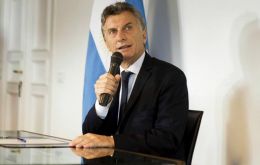
On a residential street corner in Buenos Aires, Van Koning Market sells imported beers to the city’s well-heeled. Since it opened in June last year costs have soared. The peso has plummeted, meaning wholesale prices have shot up. Inflation is running at 26%; the reduction of government subsidies means the monthly electricity bill has risen from 700 pesos to 4,000 pesos (US$ 142).
-
Saturday, June 30th 2018 - 15:49 UTC
Argentine Peso and equities end the week back on skid row

After a week of relative stability, the Argentine peso slid more than 2.5% percent on Friday, as an economic crisis marked by high inflation, wobbly growth and an outflow of capital began to bite again.
-
Wednesday, June 27th 2018 - 08:12 UTC
Argentine economy shrinks 0.9% as agriculture hit by drought plummets 31%
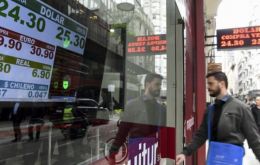
Argentina’s economy shrank in April for the first time in more than a year, government data showed on Tuesday, while the central bank held its policy rate stable at 40% in the first rate decision since a shakeup in its leadership.
-
Tuesday, May 29th 2018 - 09:09 UTC
The Way Out of Argentina’s New Crisis

The late MIT economist Rüdiger Dornbusch used to tell his students in the 1980s that there are four kinds of countries: rich, poor, Japan, and Argentina. No one frets anymore about Japan buying its way to world domination. But the world is worrying again about Argentina.
-
Saturday, May 26th 2018 - 08:54 UTC
Argentine church independence message: sigh of relief for embattled Macri
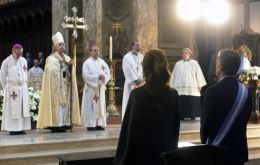
A sigh of relief from Argentine president Mauricio Macri and his administration following on Friday's Tedeum by the Archbishop of Buenos Aires, which marks the Church' message on May 25, the symbolic celebration of the first independence efforts during the 1810 Revolution.
-
Wednesday, May 16th 2018 - 09:09 UTC
Argentina seems to have managed Tuesday's challenge, but what comes next?
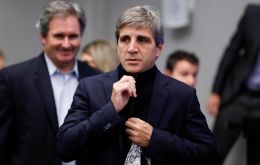
Argentina’s central bank on Tuesday rolled over billions of dollars in short-term debt, providing President Mauricio Macri’s government with a shot of confidence after weeks of economic volatility. In a statement, the Argentine central bank said it refinanced all of the US$ 26 billion of peso-denominated short term bonds that matured on Tuesday. Investors were attracted by renewal rates of 40% for 36-day Lebac and 38% and 38,5% for 90 days and plus, Lebacs.
-
Monday, May 7th 2018 - 08:29 UTC
Argentina and China among the most vulnerable markets, says IIF
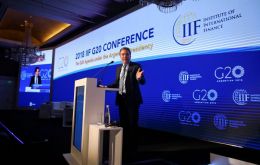
The markets of China, Ukraine, Argentina, South Africa and Turkey are the most vulnerable among all developing countries in terms of financing needs, reserve adequacy, asset valuation, institutional quality and trade resilience, according to a review by the analysts of the Institute of International Finance (IIF).
-
Thursday, May 3rd 2018 - 08:39 UTC
Lack of investor confidence sees the Argentine Peso fall 3.11% against the dollar
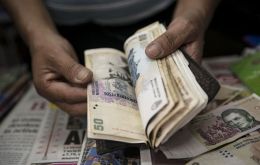
Argentina’s peso currency closed down 3.11% on Wednesday at an all-time low of 21.2 per U.S. dollar, even as the central bank continued selling dollars to try to halt the slide of the local currency, traders said. The currency’s sustained weakening showed a lack of investor confidence in Latin America’s third largest economy, which is blighted by one of the world’s highest inflation rates.
-
Thursday, April 12th 2018 - 08:59 UTC
Argentina central bank keeps benchmark interest rate at 27.75%
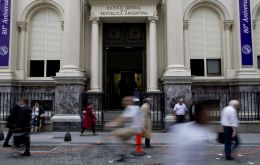
Argentina’s central bank held its benchmark interest rate at 27.25% this week, the monetary authority said in a statement, noting that high-frequency indicators suggested core inflation would remain high in April, but below March’s levels.
-
Thursday, February 22nd 2018 - 09:41 UTC
Argentine union leader Moyano remembers Macri where the real opposition stands
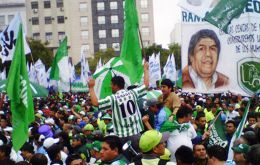
Argentina's teamsters powerful boss, Hugo Moyano supported by members from banks, judicial and teachers unions, plus social, picketers and left wing groupings, together with Kirchner followers marched on downtown Buenos Aires Wednesday evening for a huge rally to protest President Mauricio Macri's economic policies and attempts to reform labor legislation.
